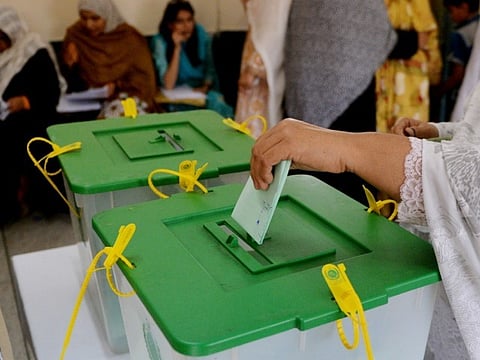Crucial meetings on Pakistan electronic voting machines on Monday
Poll panel had raised objection on use of machines citing lack of security, transparency

Islamabad: In the backdrop of serious allegations levelled by the ruling Pakistan Tehreek-e-Insaf (PTI) ministers against the Chief Election Commissioner (CEC) of Pakistan, two important meetings are scheduled for Monday, September 13.
On Monday, immediately after President Arif Alvi’s address to Parliament on the eve of the new parliamentary year, members from the treasury benches are expected to give a go-ahead to the electoral reforms bill that will sanction among other things, use of Electronic Voting Machines (EVMs) in next general elections of 2023.
Another crucial meeting will be chaired by the CEC at the Election Commission of Pakistan (ECP) and the commission will weigh various options under the law and constitution of the country to respond to the Minister for Railways, Azam Swati who in a recent meeting of the Senate’s Standing Committee had alleged the ECP was a tool in the hands of the opposition parties and the CEC had received bribes from them. We should set such institutions on fire, Azam Swati had said in that meeting.
Two members of the ECP present in that meeting had walked out in protest over the remarks by a sitting minister against a constitutional institution of the country.
Swati joined by ministers
After Azam Swati’s show of sound and fury, PM’s Adviser on Parliamentary Affairs Babar Awan and Information Minister Fawad Chaudhry also joined him and criticised the ECP for “feeling threatened by use of technology.”
What infuriated the minister and his colleagues was a list of 37 objections raised by the ECP on the use of EVMs citing serious issues of transparency, security, procurement, training and capacity of the Election Commission in using them.
The ECP in its response to the government’s proposal to use EVMs made it clear that the use of electronic voting machines was not possible on short notice as general elections were only one-and-a-half months away and EVMs could not prevent misuse of state authority, election fraud, electronic ballot stuffing, vote buying, the law and order situation, dishonest polling staff, widespread political and electoral violence and abuse of state resources.
The ECP also pointed out that Germany, Holland, Ireland, Italy and Finland had already abandoned the use of EVM due to lack of security.
Opposition to boycott Parliament’s joint sitting
Taking exception to the minister’s remarks against the Election Commission of Pakistan, the opposition parties have decided to register strong protests during Monday’s session and to walk out after the Presidential address.
We shall oppose the government’s move to bypass ECP on all forums, said Maulana Fazlur Rehman, President of the Pakistan Democratic Movement (PDM), an alliance of opposition parties in a statement. Chairman of the Pakistan Peoples Party Bilawal Bhutto Zardari has also asked the CEC to stand firm as opposition parties and people of Pakistan stood by him.
ECP decision
Former Secretary of the ECP, Kanwar Dilshad while expressing his concerns over the controversy between the government and the ECP, said in case Parliament passed a law for the use of EVMs the ECP would be left with no choice but to abide by it.
“However,” he said, “it would be the sole discretion of the ECP to decide a roadmap for use of EVMs in the next general elections.”
It involves capacity building, procurement of EVMs and training of over 400,000 staff. In that background, again, the ECP would be free to decide whether it would be possible to hold 2023 general elections by using EVMs or not, said Kanwar Dilshad.
To a question about a possible action by the CEC against the ministers for maligning the ECP, he said the status of the CEC was equal to that of a judge of the high court and under Article 204 of the Constitution contempt case could be initiated against those slandering a constitutional institution of the country.
Sign up for the Daily Briefing
Get the latest news and updates straight to your inbox







